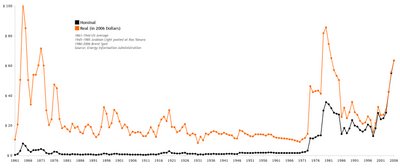Discriminating Through the Minimum Wage
Now that Nancy Pelosi is going to be speaker of the house, we can look forward to her "first 100 hours." I'd like to call it her first 100 errors. She has put forth a list of things she wants to do in the first few days after taking control. Along with funding stem cell research, reversing the recent tax cuts, and investigating Bush and nearly all the Republicans, she plans to raise the minimum wage - possibly as high as $7.25. On the surface this seems like a good idea; raise the minimum wage so poor people can make more money. The problem is that it doesn't actually work that way.
The first myth to clear up is that people are not poor because of the minimum wage. The Bureau of Labor Statistics reports that in 2005 only 2.7% of employees working in the private sector and 1.1% in the public sector were earning at or below the minimum wage. But you must take into account who these 2.7% are. The BLS also reports that "About three in four workers earning $5.15 or less in 2005 were employed in service occupations, mostly in food preparation and service jobs," and these people generally make above minimum wage with tips. Of this small percentage making below minimum wage, half are under the age of 25 and a fourth are between the ages of 16 and 19. Only 15% of workers still earn minimum wage after 3 years. So, if only a very small portion of the population is making at or below minimum wage, then only a very small portion of the population can claim they are poor because of the minimum wage. In general, people are poor because they aren't skilled or productive enough to be worth more money.
In fact, it can be argued that people are unemployed because of the minimum wage. Let's say you own a business and you can afford to pay $30 per hour for labor. So, you hire 5 employees and pay them $5.15 per hour. We'll say it costs you $.85 for benefits (sick leave, workers comp, insurance) for a total of $30 per hour. If the minimum wage gets raised to $7.25 per hour it costs $8.10 per employee. Now you can only afford to hire 3 employees with benefits or 4 without benefits. Either way someone is unemployed, and it will most likely be the least productive employee who gets the pink slip.
Raising the minimum wage will only discriminate against the unskilled/uneducated and increase unemployment.




